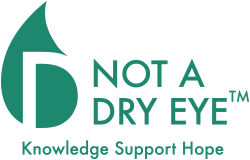Some people have no problem asking for help.

Maybe they recognize that we live in an interdependent society where everyone relies to some degree on others. So they already know that no one can exist without help. Or maybe they know that asking for help isn’t a sign of weakness. It’s simply an expression of need.
Somewhere along the way, we’ll all need someone else’s help. And asking for help is a skill that can be learned. Here a few practical tips that can help you when you need to ask for help.
1. Develop a personal support network that you can turn to in time of need.
For those suffering with extreme Dry Eye symptoms, the thought of developing a support network can seem daunting. It may even seem like it’s too late to start. You might have become isolated when your eye discomfort prevented you from leaving the house and taking part in normal daily activities, limiting your interactions and access to others.
Even if that’s the case, it’s never to late.
Start with basics. Make a list – even if it’s just in your head – of the people you know who you think you can reach out to. Write down their contact information (so you don’t have to look at a screen): name, phone number, and when is a good time to call. Then give them a call. You might not need any help just yet, but let them know you might ask in the future. If you give them a brief update about your eye condition and tell them how difficult it has become for you to do x, y, or z, they might even offer to help you with x, y, or z.
Then add neighbors to your list and give them a call. Or if it’s appropriate, ring their door bell.
When you initially make contact, try not to burden these people with all of your problems. They need to know what’s going on with your eyes, but for now everything else is just noise. Focus on the condition that’s driving you to ask for help – the discomfort in your eyes. Later, when you are better acquainted, and if there’s an appropriate time and place, you can share more.
2. Always be open to making a new friend, especially among your neighbors.
You never know when you’re going to make a new friend. At the bus stop. At the grocery store check out line. While taking a walk.
Introduce yourself. Be friendly and you will make friends.
Neighbors who are friends can be especially helpful once they learn that you need help, because neighbors are right here. They don’t need to drive long distances to get to you. And because helping each other is something that neighbors already do.
But remember to be a friend as well. Listen. Be positive. Have compassion. Help out when you can. Friendship is a two-way street.
3. Don’t act as if you’re being rejected by someone who can’t help.
Asking for help is not a job interview, a date, or a movie audition. You aren’t being rejected if someone says they can’t help. They just can’t. Accept it, ask if you can ask for help again in the future, and move on. And don’t ever make anyone feel guilty for not being able to help. You’re requesting help, not demanding it (see #10 below).
4. Try asking different people for help.
Even if you have a BFF who’s always available, others might want to help. In fact, for some people being asked to help is an honor. Asking different people for help is a way of nurturing your support network, which is important because you never know when your BFF will suddenly get a new job or have her own medical emergency. Or one person in your support network may feel they can help sometimes, but not always. So ask around.
Apps like the one provided by CaringBridge can help you organize your support network. CaringBridge is a non-profit organization that provides an online scheduling app so everyone in your network knows when you need help and can volunteer their time when they’re available. This way you don’t have to call everyone in your support network individually to let them know you have another appointment with your doctor.
5. Take advantage of government programs for people with permanent or temporary disabilities.
Depending on your country, state, city, province, or local laws and regulations, there may be programs that you can take advantage of without even having to be officially disabled. In the US, for example, there is a federal transportation program that provides door to door transportation services for people who qualify. If you qualify, you won’t have to drive yourself or ask someone in your support network to drive you shopping or to your next local doctor’s appointment.
6. Take advantage of volunteer programs.
Whether it’s volunteers who drive people to the grocery store or pilots who fly patients to medical appointments on the opposite coast, you may qualify for any number of programs offered by volunteer organizations in your area. These can help you resume some aspects of a normal life, or even save you thousands of dollars. It may be worth while to do some research, or ask someone in your support network to do the research for you.
Look for support groups in your area, not just for Dry Eye, but for other conditions or disabilities you may have. You might find people who have had to overcome similar obstacles who can give you advice on overcoming yours.
7. Be specific. Say exactly what you need when you’re asking for help.
If you need a ride to the doctor for an appointment on Wednesday at 2:00 p.m., say exactly that. Don’t make anyone guess what you need. Don’t assume that anyone knows what you need. If you need to go shopping, or need help opening that new sports water bottle, or you just want to talk to someone, say so. Don’t beat around the bush. Just ask.
8. Be positive when getting help.
Consider how well you know someone. If it’s the first time they’re helping or if you don’t know them that well, you don’t want to scare them off with something that’s emotionally charged, too negative, or alarming.
But don’t be afraid to say what you’re feeling. Just try to do it in a positive or objective manner. Most people prefer to be around others who have a positive attitude. And when we’re struggling with Dry Eye, the more supportive people we can gather and keep around ourselves, the better.
After all, we’re all struggling with something. Whether it’s a medical condition or something else, life happens to everyone. It’s how we approach it that matters.
So stay positive. It will help your relationship with your support network as much as it will help you.
9. Listen to others and practice The Golden Rule.
As noted above, even though what’s going on with your eyes may seem insurmountable, everyone has their own problems that to them may seem insurmountable: medical conditions, problems at work, family issues, or whatever else. The list goes on and on. So have as much compassion and empathy for others as you would want others to have for you. In other words, practice The Golden Rule.
When you’re listening, one thing you’ll probably hear is advice for treating your eyes. This advice can sometimes be exasperating. Most people who are themselves unfamiliar with Dry Eye won’t be able to give you very good advice. But they might still try. Be patient with them too.
How to respond when someone offers advice about Dry Eye
10. Never demand. Always request. And remember to say “Thank You.”
Some animal trainers say that when they’re giving an animal a command they aren’t really giving a command. They’re making a request and giving the animal the option of filling that request…or not. If the animal does what it’s asked to do, there’s a reward at the end in the form of food or something else the animal likes, like a belly rub.
It’s a good approach and one that can easily be adapted by anyone asking for help. First, remember that you’re making a request, not a demand. Then always give the option of saying no without guilt. And the reward at the end (no, not a belly rub) can be a sincere, heartfelt “Thank You.” Because who doesn’t like to hear “Thank You?”
11. Get help from professionals when you need it.
Whether it’s a doctor, a mental health professional, attorney, local government representative, nurse, or other professional, don’t hesitate to ask for help when you need it. Waiting too long can make things worse or make problems more difficult to solve. Professional help can sometimes be expensive, so it’s important to be mindful when seeking this help. But if you need professional help, by all means seek it out. Remember that asking for help isn’t a sign of weakness. Asking for help is just an expression of need.
If you are having suicidal thoughts because of your eye pain or discomfort, seek help immediately from your primary care or eye doctor, spiritual advisor, mental healthcare provider, a trusted family member or friend, or a suicide prevention hotline.
- In the US, National Suicide Prevention hotline: 1-800-273-TALK (8255)
- Website: suicidepreventionlifeline.org
Send your comments to blogger@notadryeye.org

